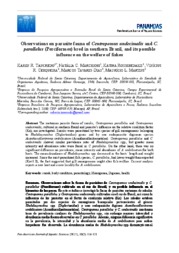Observations on parasite fauna of centropomus undecimalis and C. parallelus (perciformes) bred in southern Brazil, and its possible influence on the welfare of fishes.
Observations on parasite fauna of centropomus undecimalis and C. parallelus (perciformes) bred in southern Brazil, and its possible influence on the welfare of fishes.
Autoria: TANCREDO, K. R.; MARCHIORI, N. C.; ROUMBEDAKIS, K.; CERQUEIRA, V. R.; TAVARES-DIAS, M.; MARTINS, M. L.
Resumo: The metazoan parasite fauna of snooks, Centropomus parallelus and Centropomus undecimalis, cultured in southern Brazil and parasite?s influence on the relative condition factor (Kn), are investigated. Snooks were parasitized by two species of gill monogeneans belonging to Rhabdosynochus (Diplectanidae) genus and by one endoparasitic digenean species Acanthocollaritrema umbilicatum (Acanthocollaritrematidae). Centropomus parallelus and C. undecimalis showed similar prevalence rates of Rhabdosynochus spp., but greater mean intensity and abundance rates were found in C. parallelus. On the other hand, there was no significant difference on prevalence, mean intensity and abundance of A. umbilicatumfor both hosts. The mean abundance of Rhabdosynochusspp. decreased as the hosts´ length and weight increased. Since the most parasitized fish species, C. parallelus, had lower weight than expected (Kn<1.0), the fact suggested that gill monogeneans might alter fish welfare. Current analysis reports a new host and a new locality for A. umbilicatum.
Ano de publicação: 2015
Tipo de publicação: Artigo de periódico
Unidade: Embrapa Amapa
Palavras-chave: Digenea, Fator de condição, Monogenea, Parasitologia, Robalo, Saúde, body condition, parasitology
Observações
1 - Por padrão são exibidas publicações dos últimos 20 anos. Para encontrar publicações mais antigas, configure o filtro ano de publicação, colocando o ano a partir do qual você deseja encontrar publicações. O filtro está na coluna da esquerda na busca acima.
2 - Para ler algumas publicações da Embrapa (apenas as que estão em formato ePub), é necessário ter, no celular ou computador, um desses softwares gratuitos. Sistemas Android: Google Play Livros; IOS: iBooks; Windows e Linux: software Calibre.
Acesse outras publicações
Acesse a Base de Dados da Pesquisa Agropecuária (BDPA) para consultar o acervo completo das bibliotecas da Embrapa.

